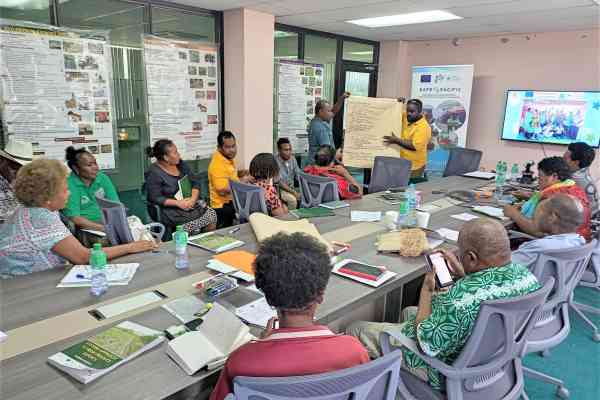The Tuvalu Department of Agriculture/Biosecurity team preparing fruit fly traps and lures ahead of field deployment.
Armed with more than 500 traps, three types of pheromone lures and other supplies, the Pacific Community Land Resources Division Biosecurity SPS (Sanitary and Phytosanitary Standards) and Plant Health teams have joined with the Tuvalu Department of Agriculture on a mission to eradicate the fruit fly pest from Niulakita Island in Tuvalu.
Fruit flies are a major fruiting vegetable crop pest not only because they damage production, but also impact market access. Niulakita Island is known for supplying breadfruit, pawpaw and other fruits and vegetables to Tuvalu’s main island, Funafuti. However, due to the fruit fly pest, the Tuvalu government has placed a ban on movement of vegetable produce from Niulakita.
With support from the EU funded Safe Agricultural Trade Facilitation through Economic Integration in the Pacific (SAFE Pacific) project, the SPC team and the Tuvalu Department of Agriculture/Biosecurity team will be on the island for two weeks to trap and monitor the fruit fly population densities, collect distribution data, conduct host survey and engage with the local community for awareness. This will help decide the right window of time to conduct mass trapping in order to suppress the population and lead into eradication.
SPC's Integrated Program Coordinator for Biosecurity SPS, Dr. Visoni Timote stated that this groundwork is extremely important in devising the right strategies to tackle Niulakita's fruit fly problem which has now existed for some time. He added that continuous but consistent efforts are necessary for which the SPC team is also training officers from Tuvalu Department of Agriculture/Biosecurity as eradication is a long term goal and the officers will continue to carry out the required work after the SPC team returns.
The SPC team setting fruit fly traps inTuvalu
Niulakita atoll is located on the southernmost part of the Tuvalu island group. Travelling to the island takes more than 10 hours by boat from Funafuti.
“The request to eradicate the fruit fly pest came from the Tuvalu Minister for Agriculture and the Director for Agriculture when they attended the Pacific Week of Agriculture in Fiji earlier this year,” said Atumurirava Fereti, the SPC LRD Pest and Disease Advisor. “Working with our Tuvalu biosecurity counterparts, we have mapped and created a trapping grid of Niulakita atoll by plotting all waypoints in GPS, and using these waypoints we'll locate our trap deployment sites.”
Tuvalu’s Director of Agriculture, Matio Lonalona welcomed the visit, saying this will allow the Ministry to fast track their work on suppressing the pest. “The Tuvalu Government plans to transform Niulakita Atoll to a fully organic island. However, one of the major obstacles to this initiative is the presence of fruit flies affecting the production of fresh produce. We want to lift the ban once the fruit fly population is suppressed or eradicated and allow the people on Niulakita to trade again and access local markets for their produce,” concluded Lonalona.
The SPC team will hold further trainings with Tuvalu’s biosecurity team on servicing of the traps as well as collection, packaging and shipping of the specimens to SPC regional Plant Health Lab for further testing, if required.
Media enquiries
Matilda Simmons, SPC LRD Communications Assistant: [email protected]
Jamie Kemsey, SPC LRD Information, Communications and Knowledge Management Advisor: [email protected]
